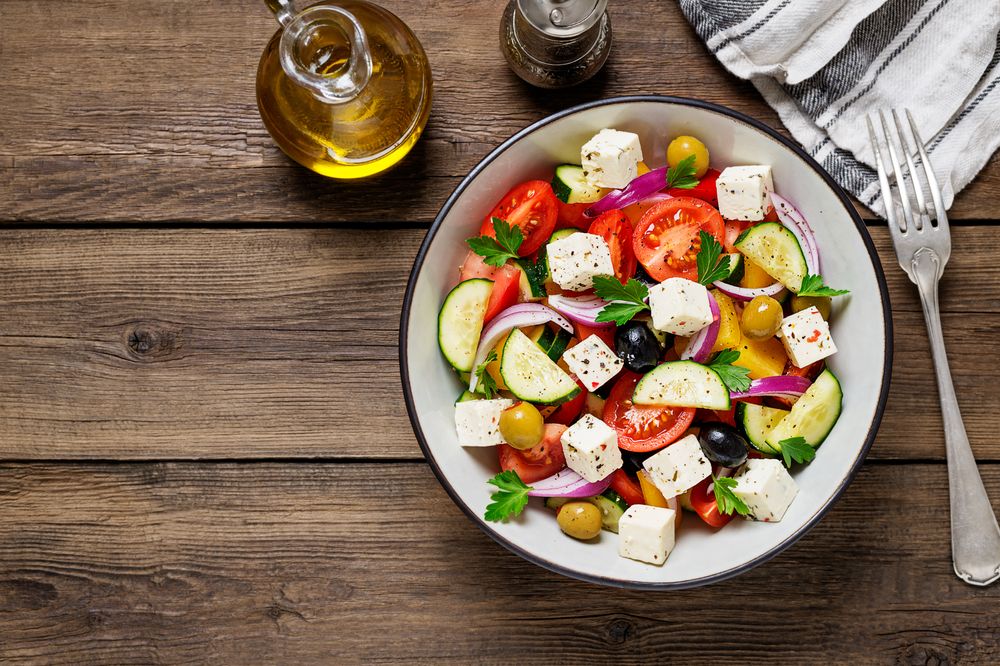Cheese – Health Benefits, Nutrition and More

Parul Dube
June 26, 2025

Parul Dube
June 26, 2025
Cheese is one of the top dairy products that people consume. According to the statistics recorded in 2020, the average consumer consumed around 40.2 pounds of cheese. Isn’t that cheesy? The world’s oldest cheese goes back a long way in history. History says that Egyptians discovered cheese in ancient times. It tasted sour and salty and had a crumbly texture.
Today, cheese comes in different flavours, textures, shapes, and sizes. We also have vegan cheese available in the market, with no trace of dairy in it. So now, even lactose-intolerant folks can enjoy the deliciousness that cheese adds to the meals.
Since cheese is such a loved food item, let us know more about it. This article answers questions like, why is cheese essential for us? Does it add to anything on the health factor? What are the benefits of consuming cheese?
The Nutritional Value of Cheese differs based on its type. Here are a few nutritional profiles of different cheeses:
One ounce (28.35gms) of brie contains:
One ounce (28.35gms) of cheddar contains:
One ounce (28.35gms) of feta contains:
One ounce (28.35gms) of gouda contains:
One ounce (28.35gms) of mozzarella contains:
The nutritional value mentioned here is for full-fat cheese. One ounce of cheese is roughly an inch of cheese cube.
Cheese is good for our health. Like all other dairy products, it is rich in calcium and protein. Let us look at some must-know benefits of cheese.
Our body requires different minerals for better functioning. Among them, calcium is the most crucial one. Calcium helps in our vascular functions, nerve transmission and supports bone health.
Our bones are an integral part of our bodies. They keep developing and changing as we grow. Our bodies are not capable of forming new calcium. We keep losing calcium through dead skin cells. Hence, a balanced intake of calcium is crucial.
Cheese is an excellent source of getting our daily calcium intake without supplements. According to a study, Parmigiano Reggiano, a type of cheese, is the best source of calcium.
Many nutritionists and scientific studies relate obesity and weight gain with hypertension. But, unfortunately, it also leads to an enlarged left ventricle which increases the risk of heart failure.
According to research, there is evidence of a non-harmful relationship between cheese consumption and risks of total cardiovascular disease.
You cut back on sugars and starches or carbohydrates to lose weight. But it is not about eating less but eating healthy.
Cheese is rich in calcium and protein. When you get adequate amounts of calcium, you burn more fat. In addition, proteins found in cheese accelerate your metabolism and reduce your appetite.
When we talk about health, our teeth get neglected most of the time. But do not worry, as cheese is one of those food items that effectively works on your teeth too.
As per a study, cheese has high phosphate and calcium levels. They naturally strengthen teeth and bones. It also helps to balance the pH level of your mouth. Balancing pH level means less acid, which harms your mouth. In addition, it cleanses your saliva and prevents cavities.
Vitamin B-12 or Cobalamin is a water-soluble vitamin. It keeps your blood healthy. Vitamin B-12 is also essential in the formation of DNA.
As per research, a few dairy products, like cheese, help derive vitamin B-12. B12 also aids in improving metabolism.
Cheese is an excellent source of protein, especially for vegetarians. For example, whole milk Swiss cheese, Cheddar cheese and Paneer or Cottage cheese have the highest Vitamin B-12.
Osteoporosis is a disease characterised by fragile and porous bones. It is the leading cause of fractures, with 1.5 million each year. It occurs due to low or poor calcium consumption, which causes the gradual breakdown of bones.
According to the study, cheese, especially Parmesan Cheese, fortified with vitamin D, can balance vitamins and minerals.
Conjugated linoleic acid, or CLA, is an essential, “healthy” fat commonly found in dairy and meat, primarily from grass-fed cows, sheep, and goats. As a result, you can experience a loss of body fat and build lean muscle. It also supports immune and inflammatory systems, improves bone mass, regulates blood sugar levels, and reduces the risk of heart disease.
According to research, when cows have access year-round to fresh grass, you can have as much as 30 mg of CLA per ounce of cheese produced.
Colorectal cancer is one of the most common cancers in the world. Apart from the colon, it also affects the digestive tract. Symptoms include abdominal pain, nausea, vomiting, rectal bleeding. Unfortunately, it causes death in the long run.
As per a study, milk and cheese can prevent some common cancers, such as colorectal and bladder cancer. In addition, calcium, vitamin D, and lactic acid can potentially protect you from these cancers.
You’re shedding skin cells throughout the day, so it’s essential to keep your skin glowing and in good condition. An effective routine can help prevent acne, treat wrinkles, and help keep your skin looking its best. In addition, Vitamin B in cheese aids in the growth of cells. Thus you have glowing and blemish-free skin.
Cheese is a very versatile element. It comes in different textures, flavour profiles, shapes, and sizes. So, naturally, the way to use each of them varies as well. There are certainly more cheese variants, but these are the most well-known ones.
One of the most popular cheese forms in Indian Households cottage cheese is paneer.
Cottage cheese is a derivative of full-fat milk. You get it by curdling it and then draining it out. It is very nutritious and rich in protein. It has a mildly sweet taste.
One uses cottage cheese in curries, gravies and stuffing in parathas and koftas. No Indian elaborate meal is complete without this ingredient.
Whether put in fried sticks, grated over pizzas and pasta, or garnished in freshly made salads, mozzarella is a popular and well-known cheese type. It originated from Southern Italy and is typically made with buffalo milk.
However, nowadays, it is also made from cow’s milk. It has a mild flavour and is very soft and chewy in texture. Lasagna and pizzas use this variety generously. Fresh mozzarella also goes in making yummy sandwiches and salads.
Feta Cheese is the best option when we need a little bit of tang and a change of texture in our salads. It is a little tangy and salty. Feta Cheese has its roots in Greece and is very creamy in texture. It tastes best when served with olives, nuts and roasted peppers.
Cheddar Cheese is rich in protein and highly nutritious. It also has a high content of Vitamin B-12. It has its emergence from England, named after a village.
Cheddar Cheese has a nice creamy flavour and smooth texture. Kinds of pasta, chicken dishes, and toast taste great with cheddar cheese. It is usually aged and has a rich flavour profile.
Just like Mozzarella Cheese, this cheese also has its origin in Italy. Better known as Parmigiano Reggiano, it is typically used in pasta dishes.
It is made from cow milk and has a robust flavour. It is the type of cheese that is cured and aged for a good period: the aged, the better the taste.
So, it is an excellent time to dive into some healthy recipes that taste good and improve our health.

Preparation Time: 20 minutes
Number of servings: 6

Preparation Time: 10 minutes
Number of servings: 2
Remember that every food item is good for you when taken in moderation. However, it is vital to know the correct quantity and the benefits:
Cheese is a good meal ingredient when you consume it in moderation and follow correct precautions. But, remember, at the end of the day, you know your body best. And you know its limitations as well.
A: Cheese might be bad for you if you’re allergic to casein. It may also affect you if you’re lactose intolerant.
A: Cheese is an excellent source of Calcium and Protein. It further prevents obesity and heart disease. The right amount helps lose body weight and improves oral health.
A: Overeating cheese or eating it every day may cause constipation. So, it is better to eat it in moderation.
A: Yes. There are several health benefits if you eat it in moderation.
A: Vitamin B in cheese aids in the growth of skin cells, which gives you glowing skin and helps you get rid of blemishes.
A: Cheese is unsaturated fat. Unmeasured consumption of cheese will cause weight gain instead of loss.
A: No, if you eat it in moderation, it will not cause belly fat.
A: Cheese is high in saturated fats, which raises cholesterol levels that have many negative impacts.
A: Cheese is essentially a coagulated form of milk. It is rich in protein. Cheese also has lower lactose content.
A: Including calcium-rich low-fat cheese in your low-cal meals may help you lose a little weight while also protecting bone health.
A: Cheese is a calorie-dense food. Depending on the variety of cheese you eat, you get about 100 calories per ounce.
A: There are approximately 350 calories in 100 grams of cheese.
A: There is approximately 25g protein in 100 grams of cheese.
A: Although cheese is saturated fat, it is rich in protein and calcium.
A: 100g cheese has approximately 350 calories, 33g total fat and 99mg cholesterol.

